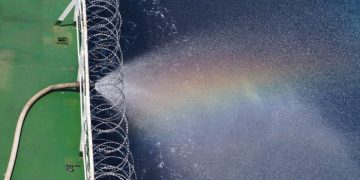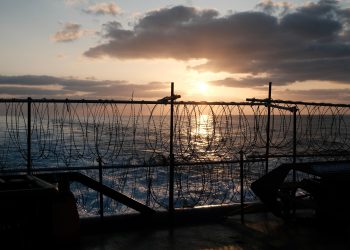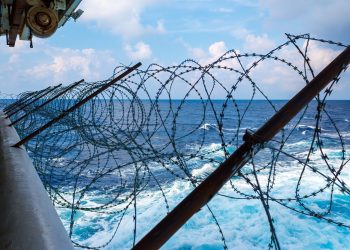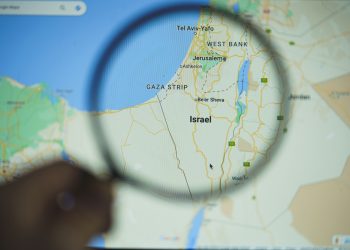In a recent article, security experts Christian Bueger and Timothy Edmunds argue that developments in the maritime arena have flown beneath the radar of much mainstream international relations and security studies scholarship, and that a new agenda for maritime security studies is required.
Specifically, the authors examine the ways in which maritime security actors have responded to maritime security challenges in practice, focusing on issues of maritime domain awareness, coordination of action, and operations in the field.
When drafting its maritime security strategy, the EU conducted a mapping exercise of relevant agencies within the organization itself and its members. This exercise identified 383 groups or organizations that dealt with the issue in one way or another, reflecting the complexity of the maritime security environment at the European level alone. Similarly, the Contact Group on Piracy off the Coast of Somalia (CGPCS) faces the challenge of bringing together and coordinating the activity of over 80 states and 25 international organizations in order to address piracy in the western Indian Ocean. The organizational and international diversity of such initiatives illustrates the challenge of producing coherent and holistic responses to the maritime security problematic.
In the western Indian Ocean region, this challenge has led to a range of experiments in coordination and novel forms of association and practice within, among and between the various different actors involved in the maritime security complex. These innovations can be observed at three levels: first, an epistemic level centred on joint knowledge production; second, a coordination level focused on devising common scripts for action; and finally, an operational level incorporating joint maritime security activities in the field.
Maritime domain awareness and new epistemic infrastructures
At the epistemic level, innovation in the maritime security complex can be seen in a range of new mechanisms for knowledge production about the maritime security environment, and in particular the development of what are often called maritime domain awareness (MDA) or maritime situational awareness (MSA) initiatives. Such activities originate in efforts to improve mariners’ awareness of current and impending weather conditions but, as Jeff Kline notes, increasingly provide ‘an inspirational template for countering human-made threats to the maritime domain’. In order to do this, they draw on a wide range of data, including the (voluntary) tracking of ship movements through information-gathering systems such as the Automated Identification System (AIS); active surveillance through naval patrols, aerial reconnaissance, satellite imaging and radar systems;43 and the collection and analysis of data from national and international agencies with a role in maritime security, including port authorities, customs and law enforcement. MDA aims to provide a rich database of information, often in real time, against which maritime security activities—including interceptions and inspections of vessels at sea—can be planned and targeted, through centralized data-mining techniques.
The ambitions of MDA are considerable, and go well beyond marine surveillance as conventionally understood. Indeed, the US approach to MDA aims at nothing less than ‘the effective understanding of anything associated with the maritime domain that could impact the security, safety, economy, or environment of the United States’. Such aspirations require significant transnational cooperation, as well as engagement with a wide range of substate and private actors. Other initiatives exploit the opportunities presented by communication and information technologies to open up new channels of knowledge exchange between civil and military actors, and between the navies or vessels of nations that might normally be reluctant to cooperate with each other. For example, international action against piracy off the coast of Somalia has been facilitated by the information-sharing platform Mercury, which allows various stakeholders—including national navies, international missions, and civil information-sharing centres—to communicate with each other through synchronous text-based chat, with a live feed on naval operations and piracy incidents providing real-time data to all participating actors.
Coordination and maritime security governance
Similar innovations are taking place at the level of coordination and maritime security governance. Here, the maritime security agenda is giving rise to a number of new organizational mechanisms, the aim of which is to coordinate action in the face of shared challenges. Governance mechanisms such as the CGPCS are process-driven, informal organizations that work on principles of inclusivity rather than representation. They bring together a heterogeneous set of actors, including states, international organizations, industry associations, think-tanks, and civil and military representatives of implementing bodies in order to coordinate shared responses to maritime security challenges. Although the decisions of such organizations tend to be non-binding in nature, they exert a substantial orchestrating effect and increasingly engender new forms of transnational coordination. The CGPCS, for example, has facilitated the development of a legal system on the basis of memorandums of understanding by which piracy suspects can be arrested, transferred, prosecuted and jailed across different jurisdictions.
In contrast to traditional regimes focused on rule enforcement, these organizations emphasize problem-solving and policy learning, and aim to develop new communities of inquiry among novel associations of actors, including many whose relations may under other circumstances be distant or even antagonistic. For instance, the Djibouti Code of Conduct brings together Arab states with partners from eastern and southern Africa to coordinate maritime security responses to piracy. A similar spirit is observable in many of the recent maritime security strategies discussed above. The EU strategy, for example, is not centred on creating new organizations and hierarchies to centralize the coordination of responses, but instead emphasizes a flexible and problem-orientated approach to shared challenges of maritime security governance.49
Operational coordination
These forms of association also find expression at the operational level, where, to date at least, they have been most prominent in anti-terrorist and counter-piracy activities. Examples include NATO’s Operation Active Endeavour (OAE), located in the Mediterranean, and the US-led Combined Maritime Forces (CMF), focusing on the western Indian Ocean. These operations were initially tasked with preventing the proliferation of WMD and terrorist activities. However, since starting operations in 2002 they have considerably expanded their mandates and range of operations, which now include broader patrolling tasks, surveillance and interdiction. Both missions are characterized by a flexible participation structure. A range of non-NATO members have participated in OAE, for example, including Georgia, Russia and Ukraine. The CMF framework is even more inclusive, including a range of different non-NATO navies, some of which—including those of Pakistan, Japan and South Korea—have taken command responsibility for joint operations.
Another example is the Shared Awareness and Deconfliction Mechanism (SHADE), established in 2008 to conduct informal discussion among, and remove conflict from the activities of, the diverse nations and organizations involved in counter-piracy operations off the Horn of Africa. Since 2012, 14 international organizations and 33 countries have participated in SHADE meetings. The novelty of the SHADE arrangement, and the opportunities it offers for addressing common problems, have been recognized by the US State Department, which described the organization as
“not … a coalition [which] implies [centralized] command and control. Instead [there are] three organized missions and a wide variety of national independent deployers who have simply chosen to collaborate. No one is in charge. No one has command. They deconflict and operate constructively, and that’s a new model of operation […] many countries are voluntarily collaborating to secure the maritime space. That’s a remarkable phenomenon.”
The shared challenges of the maritime security agenda are thus leading to practices that link information, actors and actions in ways that transcend established national or regional boundaries. They also bridge traditional civil–military and public–private distinctions, incorporating actors ranging from naval forces to shipping interests and private military security companies, who may be from otherwise antagonistic nations such as the United States, Iran, China and Russia. Such associations are circumstantially bounded, in the sense that they derive from specific coalitions of interest in the face of disorder at sea; in this case, the threat of piracy. However—in the western Indian Ocean region at least—it is striking that they have not dissolved with the decline of the piracy problem in the region since 2013. Indeed, there has been a gathering effort to institutionalize the priorities, infrastructures and practices of the maritime security agenda to the states of the region themselves through a process of capacity-building and devolved security governance.
Maritime security responses in the western Indian Ocean are reflected in analogues or emulations of core practices from the region in other parts of the world. For example, the G8++ Friends of the Gulf of Guinea Group is a security coordination mechanism modelled on the CGPCS. In the same region, the Djibouti Code of Conduct finds a parallel in the Yaounde Code of Conduct, adopted in 2013. The SHADE model has also been adopted elsewhere, for example in the creation of the so-called SHADE Med arrangement in 2015 to coordinate the actions of different actors and organizations in meeting the migration crisis in the Mediterranean. The Information Fusion Centre in Singapore hosts ‘shared awareness meetings’ which discuss maritime security issues and coordination in the south-east Asian region. MDA architectures are also increasingly common, including the US National Plan to Achieve Maritime Domain Awareness, the EU’s Common Information Security Environment initiative and projects to develop MDA capacities in the Arctic. While not all such initiatives are as developed or successful as their counterparts in the western Indian Ocean, they are indicative of the increasing significance of such practices in maritime security governance more widely.
Above abstract is part of an academic article, written by Christian Bueger and Timothy Edmunds, originally published in Oxford University Press, International Affairs.
The views presented hereabove are only those of the author and not necessarily those of SAFETY4SEA and are for information sharing and discussion purposes only.




























































